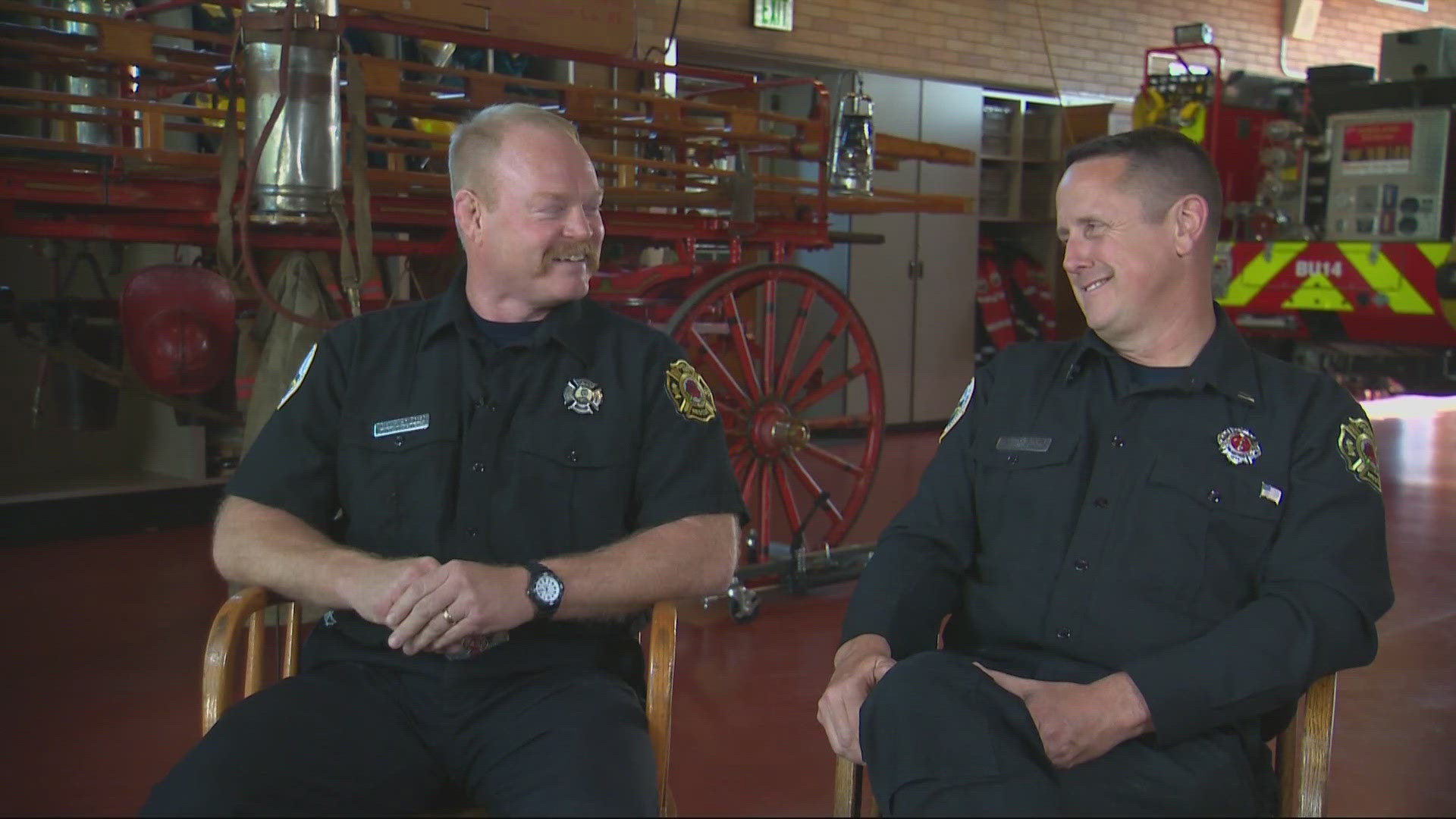PORTLAND, Ore. — It's a Tuesday afternoon at Portland Fire & Rescue's training center in Northeast Portland. As they work to sharpen their skills, firefighters are engaged and energetic, giving the impression that in this environment, things always go their way. But crews know from experience that even in the confines of a training area, real emergencies can occur.
READ MORE: KGW's Pacific Storyland series
"Eight years ago, January 2016, I was conducting a drill at what we call our burn room," said Battalion Chief Mark Tildon. "I felt normal, we came out here, we did the drill, but suddenly I started to feel exhausted."
Tildon had just turned 40. Moments after fatigue set in, he collapsed and went into cardiac arrest. Doctors later told Tildon he had suffered a complete blockage of his left anterior descending artery.
"It's also known as the windowmaker heart attack. That's a 2% survival rate and you either survive in the hospital or at a fire station," Tildon said. "Thank God I was at a fire station with my brother and sisters."
Leading up to his heart attack, Tildon said he felt fine and didn't experience any warning signs, just the day-to-day of the job.
"We tend to not take care of ourselves as well as we should," he said. "We're always taking care of others first."
But if prevention is key and Tildon seemed healthy, what more could he have done? What more could Lieutenant Aaron Gagnon have done? It's been one year since Gagnon, 53, suffered his own massive and unexpected heart attack.
"I wasn't really one of those guys you'd expect it to happen to," Gagnon said. "I think it was a surprise to a lot of people besides me."
Gagnon was off that day, driving in Vancouver when the chest pains hit. He pulled into a grocery store parking lot and called 911.
"My arm felt really heavy, I had no energy," said Gagnon. "It wasn't good."
Gagnon learned his heart attack was nearly identical to the one Tildon had suffered; same type of blockage, same 2% survival rate. But just weeks before, doctors had given Gagnon a clean bill of health.
"Then they tell me I've been walking around with 90% blockages for a couple of years," Gagnon said. "That's when I said, 'well, how in the heck am I supposed to know that?'"
A test that could save lives
Frustrated, Gagnon pressed for the answer, determined to learn something that might prevent a widowmaker heart attack from blindsiding someone else.
"The doctors said, 'well, you could have had this one CT scan, that would have shown it,'" Gagnon said. "I had never heard of that, and I was upset that I'd never heard of it. Why have I never heard it?"
The test doctors told Gagnon about is the Coronary Artery Calcium (CAC) test. Patients get a CT scan of their heart which reveals any calcium deposits in the coronary arteries. The resulting calcium score give doctors a good idea of how much plaque might be in the arteries and what medical intervention might be necessary.
Right now, the test is only offered to Portland firefighters with several specific risk factors, including diabetes, hypertension, obesity and family history. On paper, Gagnon would not have qualified for a paid CAC test, but said had he known about it, he would've gotten one anyway.
"It felt like I needed to say, what the heck, you know?" he said.
Just weeks after his heart attack, Gagnon volunteered for an internal training video discussing his experience and what he learned about CT scans — his way of sounding the alarm to other first responders.
"I said, ‘Hey, here's this test that I wish I would have had,’ and it went from there," Gagnon said.
Spreading the word
Since his heart attack, Gagnon said about 200 Portland firefighters have requested and paid for a CAC test out of pocket, including everyone he works with at Portland Station 14 on Northeast Killingsworth.
"Watching Aaron go through what he went through had a dramatic effect," said firefighter Travis Chipman. "Not only on me personally, but our family."
After Chipman took the CAC test, he shared his results with the whole team.
"They were not good," Chipman said. "Zero (calcium) is the best, then at 700 they say a heart attack is extremely likely if not imminent. I'm at 822."
Chipman said he wouldn't have known that without Gagnon.
"I'm very grateful," he said.
"We get close," Gagnon said. "We all become like brothers and sister and family."
In Gagnon and Chipman's case, real family ties now connect them as co-grandparents.
"Our children are married to each other," said Gagnon with a smile. "My daughter and his son are married, and we have a shared grandson."
A grandson who might be missing one or possibly both of his grandfathers if not for a miracle, and the resolve to make it count.
"Since Aaron's heart attack, I'm down 35 pounds and I'm eating right, so it's pretty cool," Chipman said. "The job takes a toll on our bodies. It just does."
Of the 200 firefighters who recently took the CAC test, Gagnon said about 15 of them, including Chipman, learned they needed medical or corrective intervention. And beginning next year, because of union intervention, all members over 40 will be eligible for a routine CAC test.
"It might save someone's life, you never know," Gagnon said. "We're not bullet proof. We still need to take care of ourselves."
VIDEO PLAYLIST: KGW's Pacific Storyland series

